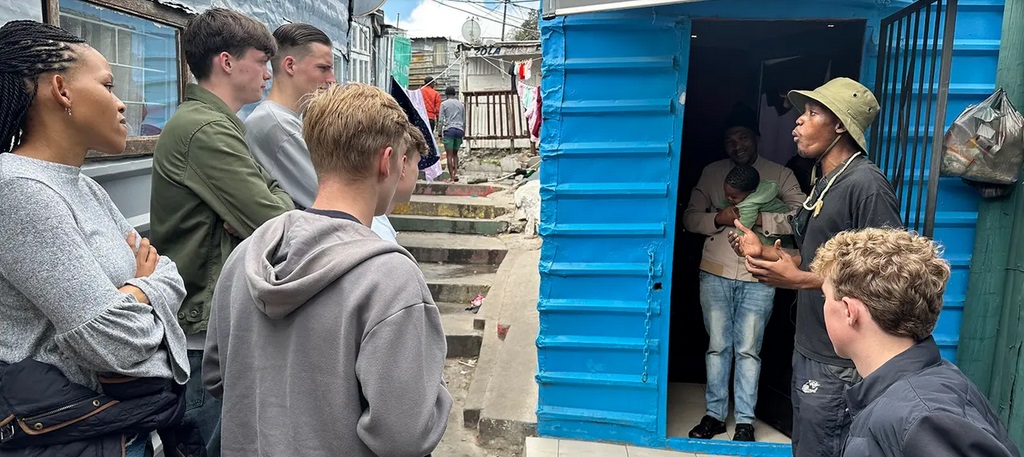Hundreds of thousands of tourists visit not only Table Mountain and Kruger National Park in South Africa but also venture into the slums. Few consider this voyeuristic – certainly not the township residents. One of the highlights of the tour through Imizamo Yethu is the illegal dumpsite next to the tin shacks. Visitors to the shantytown become quiet, standing awkwardly beside the waste. In the township of Hout Bay municipality, southwest of Cape Town, there is no garbage collection, even though there should be, as the tin shack settlement is not illegal. Here, plastic waste, rotting food scraps, human excrement lie around. The shanty residents’ huts are less than ten meters away. Even small children play here, diseases spread.
The tour is a walk for tourists – affluent people, mostly from Europe or North America, sometimes also from Asian countries. People who have enough money to afford a flight to South Africa and take a vacation there. People who do not just have tourist attractions like the iconic Table Mountain or the enchanting wine country in mind, who do not just want to see wild animals in the parks, but also the dumpsite of Imizamo Yethu.
Is this voyeurism? Staring at a bit of misery, feeling a little guilty afterwards that one is better off, but also being content that one does not have such a fate? Critics of these tours have coined the term “poverty porn.”
“I have nothing to hide, this is my life,” says township resident Andile Mbadeni, who is occasionally employed as a security guard by a security company. “If one of the tourists ever tells me how I can improve my life, then gladly.”
“I thought I knew what poverty meant”
For most tourists booking a tour through the impoverished areas, the motive is indeed genuine interest – the desire to not only relax on vacation but also learn about the lives of people in the country. The poverty tour as an educational trip.
Tom Kotecki from Poland is one such tourist, wanting to learn more about the culture and history of South Africa, as he has done in other countries. He is shocked by the harsh reality in South African townships. “I thought I knew what poverty meant. But this is even worse,” he says. “How different life can be all around the world.”
His friend Ted Kaminski adds, “I believe all forms of tourism are voyeuristic. But I also believe that such tours are necessary. Someone like me, – or anyone else in our group -, would never have had the opportunity to see this otherwise. This way, we get a glimpse.” They pay around 40 euros for the four-hour tour.
Most of the tour guides themselves live in the townships. They know the areas that could be dangerous and avoid going there. Drug gangs rule in the townships of Cape Town.
Source of income for township residents
The tour guides do not believe that booking such a tour automatically makes one a voyeur. Sakhe Goniwe, for example, who guides tourists through the misery in the township of Langa. “I take my guests to the corner where I live. To ‘the other Cape Town’,” he says. “Here live the people who work in the hotels and restaurants in the city center.”
Nobody here believes that poverty tourism is voyeuristic. “We do not want to treat these communities as if this were an experience in Kruger National Park,” says his boss, the tour operator Khonwe Tuswa. “That is why we use local tour guides. Many people living in such communities work in the tourism and hotel industry. The difference is that on our tours, you meet these people not in a restaurant or hotel in the city center, but where they live.”
Moreover, tourism brings money into the townships. Not only the tour guides earn, but also the souvenir sellers. Many of the products offered here have been made in community-based projects. “Today, we have vendors who hold cooking shows and prepare traditional African dishes,” says Khonwe Tuswa. “We have families who host volunteers and exchange students in their homes. On Sundays, we organize gospel tours.” Alone in the townships of Cape Town, over 300,000 tourists take advantage of these offerings annually.

